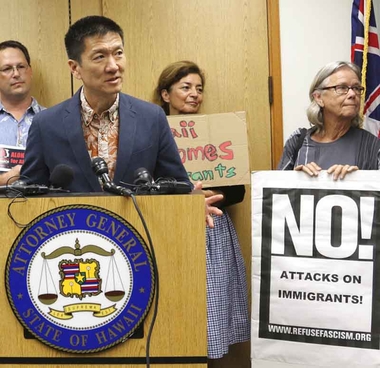Justices allow strict enforcement of Trump refugee ban

The Supreme Court is granting the Trump administration's request to more strictly enforce its ban on refugees, at least until a federal appeals court weighs in.
But the justices are leaving in place a lower court order that makes it easier for travelers from six mostly Muslim countries to enter the United States.
The high court acted Wednesday on the administration's appeal of last week's ruling by U.S. District Judge Derrick Watson that required the government to allow in refugees formally working with a resettlement agency in the United States. Watson also vastly expanded the family relations that refugees and visitors can use to get into the country.
The justices said the federal appeals court in San Francisco should now consider the appeal.
The State Department on Monday expanded its definition of "close family" to include grandparents and other relatives that constitute a bona fide U.S. relationship for visa applicants and refugees from six mainly Muslim nations.
In response to a Hawaii federal judge's order last week, the department instructed U.S. diplomats to consider grandparents, grandchildren, brothers-in-law, sisters-in-law, aunts and uncles, nephews and nieces and first cousins to meet the criteria for applicants from the six countries to receive a U.S. visa.
They had been omitted by the department after the Supreme Court partially upheld the Trump administration's travel ban in June. Initially, it had included only parents, spouses, fiancés, children, adult sons or daughters, sons-in-law, daughters-in-law and siblings. Monday's instructions change that.
Composed from Associated Press stories. Copyright 2017 Associated Press. All rights reserved.
The Gayly – July 19, 2017 @ 12:30 p.m.





